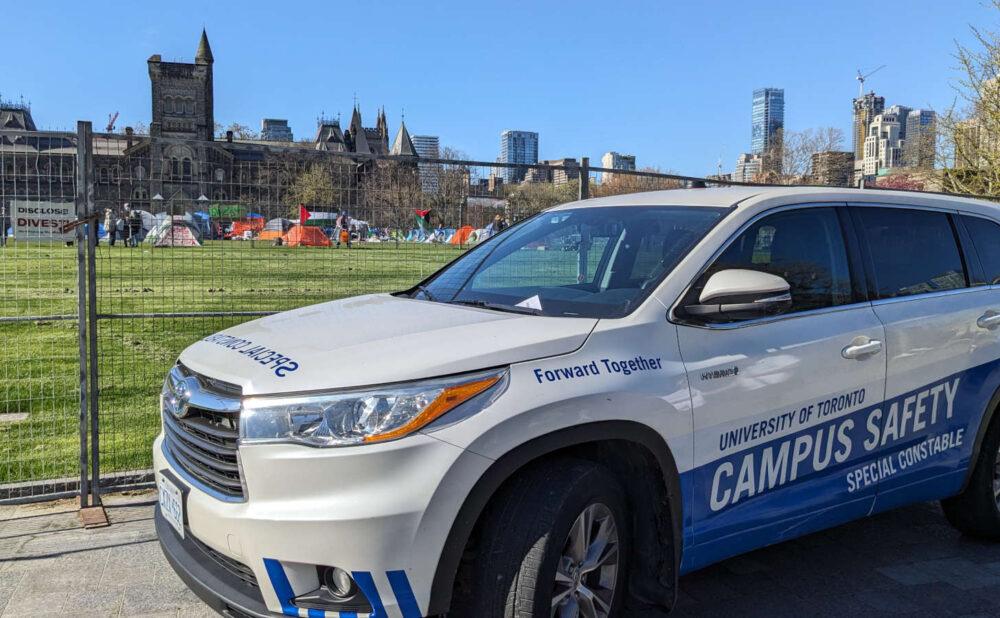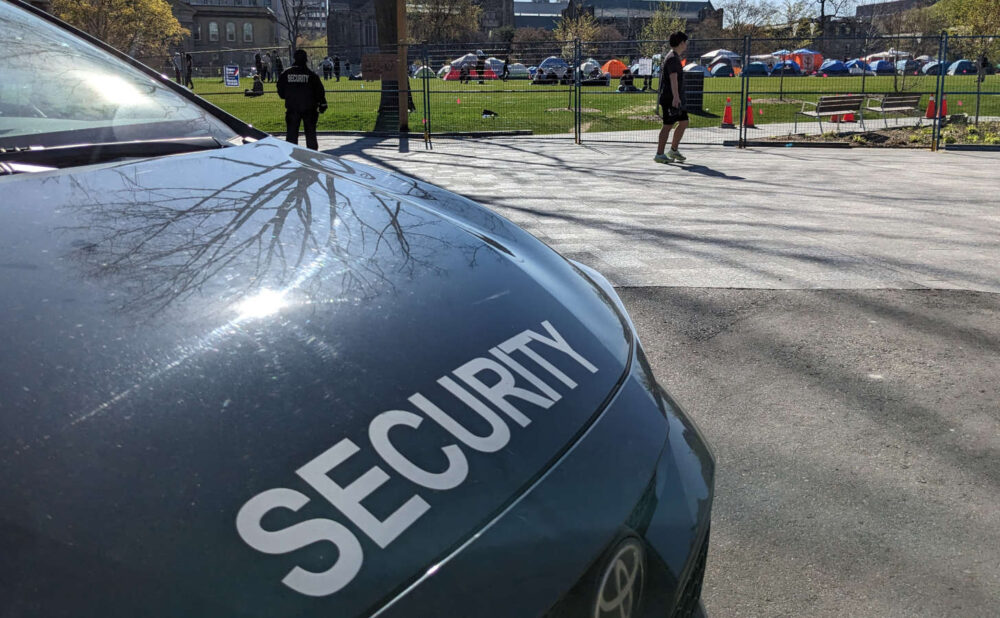Peace protestors accuse U of T of aggressive surveillance tactics
University denies installing new cameras and audio-tracking equipment
The University of Toronto and campus police are actively surveilling student protesters encamped on campus to protest the school’s financial ties to Israel, according to representatives speaking at a press conference just outside the occupation site Saturday morning. The “constant” surveillance of protesters raises concerns over privacy, the potential use of invasive surveillance and facial recognition technology, and how much information is being shared with the Toronto Police Service.
A statement posted on the University’s website on May 9 claims, “The University of Toronto is not using any form of facial recognition technology. There is a camera on site near the encampment area that was installed during recent construction on front campus. It was not installed to monitor the encampment.”
Responding to this statement at Saturday’s press conference, Rabih, a student and representative for the encampment, directs members of the press to look around them. “I see three [cameras],” he says, laughing. “I see two on top of that building. I see multiple on every corner of this university.” Noting the “constant” surveillance of students and faculty on campus, he directly contradicts the university’s claim that additional cameras were not installed to monitor the encampment, calling it “flat out wrong.”
“You can see that there have been newer cameras installed since this started, and they are completely mobile” in addition to being outfitted with audio recording and night vision technology.
Regardless of the cameras, Rabih says the encampment has had constant physical monitoring by members of campus security. “I mean, we have one right there watching the press conference. I’m talking to you,” he says, pointing at the officer. “You’re listening to me. I know you can see me.”
Rabih notes that the university has contradicted itself when speaking with encampment representatives. Despite what it claims publicly about surveillance, they have told the protesters, “We see you. We see everything you do.”
Robyn Maynard, a member of the faculty, raises concerns about how invasive surveillance technologies “amplify already existing rights abuses” and the “criminalization of dissent and the profiling of marginalized communities.”
“Facial surveillance, in particular, is among the most dangerous of the new technologies available to law enforcement, and a danger to all people, but particularly Black and other racialized communities who tend to be misrecognized at a much larger rate, which can lead to a range of issues, including false arrest,” Maynard says. All of this is a violation of the students’ right to protest and potentially endangering their safety, says Maynard.
When reached for comment, a spokesperson for the University of Toronto provides the following statement:
“All video equipment in the area has been there a long time as part of usual campus safety practices and is being used as such. Neither the university nor Toronto Police have added anything new in recent weeks. None of the equipment is capturing audio, and the university is not using any form of facial recognition technology or artificial intelligence for surveillance.
“One camera in the fenced in area outside the encampment at the south end was installed several years ago to capture construction progress and belongs to a construction company still working in that area.”
A spokesperson for the police says in an email, “Toronto Police are not surveilling the encampment site, and that includes the use of facial recognition technology.”
At the press conference, student protesters also announce that they’re aware of the University launching its own investigation into campus police, in response to concerns they’ve raised over sexual harassment, voyeurism, intentional sleep deprivation and denial of access to supplies. They say the independent investigation will be conducted by the “notorious” law firm Henein Hutchison Robitaille (HHR), pointing out the firm’s co-partner Marie Henein defended former CBC radio host Jian Ghomeshi against sexual assault charges in 2016.
Saturday’s press conference comes a day before representatives and school administrators are set to meet for “substantive” talks, which the protesters previously announced in an Instagram post. “We welcome this opportunity as a chance to move forward towards eliminating complicity in genocide,” they say in the post. “As ever, our focus is on Palestine; we expect U of T’s focus to be the same.”








